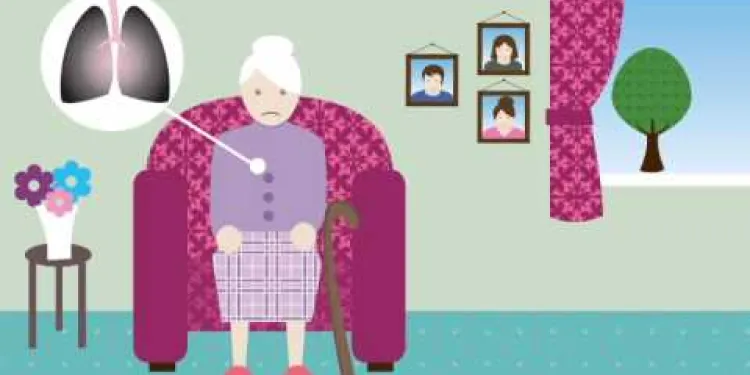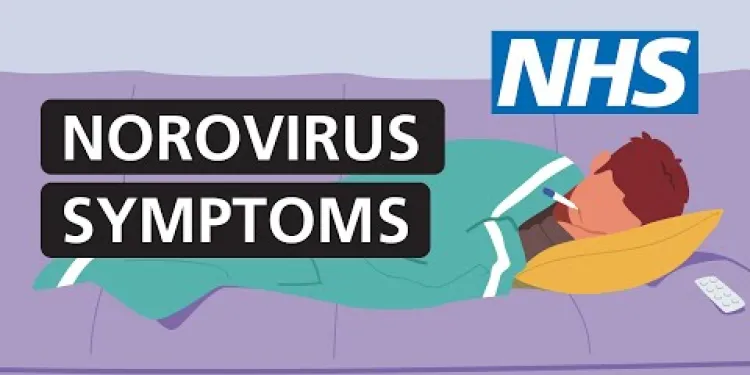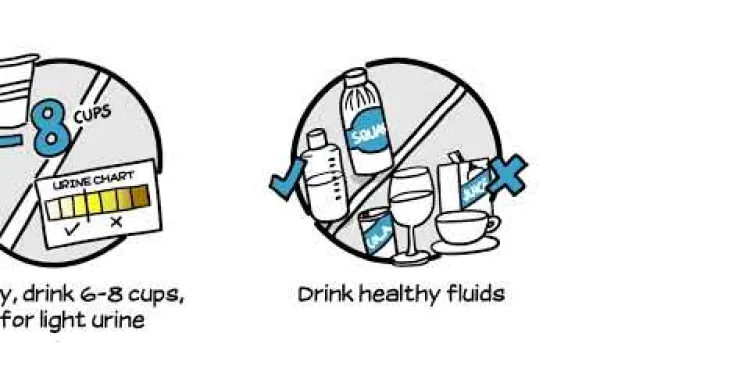Find A Professional
More Items From Ergsy search
-

Mycobacterium chimaera infection
Relevance: 100%
-

Self care: Treating ear infections
Relevance: 96%
-

Can a stoma bag cause infections?
Relevance: 66%
-

Chest infection: what should I do?
Relevance: 57%
-

Podiatrist Fungal feet - fungal infection of skin and nails and how to prevent fungal infection in feet
Relevance: 52%
-

Can new variants cause reinfection?
Relevance: 49%
-

MRSA Bug
Relevance: 42%
-

What are the symptoms of Nipah Virus infection?
Relevance: 39%
-

What are opportunistic infections?
Relevance: 37%
-

Can I get impetigo more than once?
Relevance: 36%
-

Group A strep: North East GP tells you what you need to know
Relevance: 36%
-

What is a bubo?
Relevance: 32%
-

Can you get West Nile Virus more than once?
Relevance: 32%
-

Dorothy's Story (Falls/Chest Infection)
Relevance: 31%
-

Antibiotics and You: An introduction to antibiotic resistant infections
Relevance: 31%
-

How is the Marburg virus transmitted?
Relevance: 31%
-

How is Nipah Virus transmitted?
Relevance: 29%
-

What is norovirus? (Diarrhoea and vomiting bug) | NHS
Relevance: 29%
-

Avoiding infections with urinary incontinence
Relevance: 28%
-

How is the bubonic plague transmitted?
Relevance: 27%
-

Can Nipah Virus cause neurological complications?
Relevance: 26%
-

How is West Nile Virus transmitted?
Relevance: 25%
-

How can healthcare workers protect themselves from Marburg virus infection?
Relevance: 25%
-

How can I prevent the spread of impetigo?
Relevance: 25%
-

Can impetigo become serious?
Relevance: 25%
-

How to treat a cat bite
Relevance: 25%
-

What is the difference between HIV and AIDS?
Relevance: 24%
-

What should someone do if they suspect Nipah Virus infection?
Relevance: 24%
-

Is impetigo painful?
Relevance: 23%
-

What is Nipah Virus?
Relevance: 22%
-

What are the symptoms of HIV?
Relevance: 22%
-

Which animals are known to carry Nipah Virus?
Relevance: 21%
-

How does HIV affect the immune system?
Relevance: 21%
-

What preventive measures can reduce the risk of Nipah Virus infection?
Relevance: 21%
-

Reactive arthritis
Relevance: 21%
-

Why do some variants spread more easily?
Relevance: 21%
-

NHS - Chlamydia
Relevance: 21%
-

How to treat a dog bite
Relevance: 21%
-

Is impetigo contagious?
Relevance: 21%
-

Blood Poisoning - Sepsis
Relevance: 21%
Mycobacterium chimaera Infection
Understanding Mycobacterium chimaera
Mycobacterium chimaera is a type of nontuberculous mycobacterium (NTM) commonly found in soil and water. This particular bacterium has gained attention due to its association with healthcare-acquired infections, especially those linked to surgical procedures involving heater-cooler devices. It is known to cause severe illness and can be challenging to treat due to its resistance to common antibiotics.
Transmission in Healthcare Settings
In the United Kingdom, Mycobacterium chimaera infections have primarily been connected to cardiac surgeries. Heater-cooler units, used during these procedures to regulate blood temperature, can harbor the bacterium within their water tanks. Aerosols generated by these devices can contaminate the surgical environment, leading to patient infections. While these infections are rare, they can result in significant morbidity and mortality if not promptly identified and treated.
Signs and Symptoms
Symptoms of a Mycobacterium chimaera infection can often be nonspecific and may take months or even years to manifest post-surgery. Common symptoms include persistent fever, weight loss, night sweats, muscle pain, and fatigue. Due to the delayed onset and general nature of symptoms, diagnosis can be difficult, often leading to misdiagnosis or delayed treatment.
Diagnosis and Treatment
Diagnosing a Mycobacterium chimaera infection typically involves a combination of clinical assessment, patient history, and microbiological testing, which may include blood cultures and PCR assays. Imaging studies may also be conducted to detect infection in internal organs. Treatment is often lengthy and involves a combination of antibiotics such as macrolides, rifamycins, and ethambutol. Despite appropriate treatment, the infection can be tough to eradicate, necessitating prolonged therapy and constant monitoring.
Prevention and Control Measures
To prevent Mycobacterium chimaera infections, healthcare facilities in the UK have implemented stringent guidelines for cleaning and maintaining heater-cooler units. Regular monitoring and microbial surveillance of these devices are essential to detect and mitigate bacterial contamination. Additionally, healthcare professionals are advised to stay vigilant for potential cases and report any suspected infections promptly to public health authorities.
Public Health Implications
Mycobacterium chimaera infections represent a significant public health concern, especially regarding their association with cardiac surgeries. Efforts to enhance awareness, improve diagnostic techniques, and enforce preventive measures are critical to reducing the risk of infection. Continuous research is necessary to develop better therapeutic options and to understand the bacterium's epidemiology more comprehensively.
Mycobacterium chimaera Infection
What Is Mycobacterium chimaera?
Mycobacterium chimaera is a type of germ. It is found in soil and water. It can make people very sick. It is hard to treat because it does not respond well to regular medicine.
How It Spreads in Hospitals
In the UK, this germ often spreads during heart operations. Machines used in these operations can have this germ in their water tanks. The machines can spread the germ into the air, and this can make patients sick. These infections are rare but can be very serious.
Signs It Might Be This Infection
If you have this infection, you might have a fever that won't go away. You might lose weight, sweat at night, have muscle pain, and feel very tired. These signs can appear months or even years after surgery. It can be hard for doctors to figure out what is wrong.
How Doctors Find and Treat It
Doctors look at the patient's history and may do tests on blood to find this germ. They might do scans to see if it is in the body. Treating it takes a long time and needs special medicines. Sometimes it takes a lot of time and check-ups to get rid of it.
How to Stop the Infection
Hospitals clean their machines very carefully to prevent this infection. They check these machines often to make sure they do not have germs. Doctors need to be on the lookout for signs of this infection and report any cases quickly.
Why This Is Important
This infection is a big worry because it can happen after heart surgeries. We need to teach people about it and make better tests and preventions. Research is key to finding better ways to treat and understand this germ.
Frequently Asked Questions
What is Mycobacterium chimaera?
Mycobacterium chimaera is a type of non-tuberculous mycobacterium (NTM) that is commonly found in water and soil. It is a slow-growing bacterium that can cause infections in humans, particularly in individuals with weakened immune systems.
How does a Mycobacterium chimaera infection occur?
Mycobacterium chimaera infections can occur through exposure to contaminated water or medical devices. Notably, there have been cases linked to heater-cooler units used during cardiac surgery.
What are the symptoms of Mycobacterium chimaera infection?
Symptoms may include persistent cough, fever, shortness of breath, weight loss, fatigue, and night sweats. Symptoms can appear months or even years after exposure.
Who is at risk for Mycobacterium chimaera infection?
People who have undergone heart surgery, particularly those with cardiac implants or prosthetic valves, are at higher risk. Additionally, individuals with compromised immune systems are more susceptible.
How is Mycobacterium chimaera diagnosed?
Diagnosis typically involves a combination of laboratory tests, including cultures of blood, tissue, or other fluids, as well as imaging studies like X-rays or CT scans.
What treatments are available for Mycobacterium chimaera infection?
Treatment generally includes long-term antibiotic therapy, often involving a combination of antibiotics. In some cases, surgical intervention may be necessary to remove infected tissue.
Are Mycobacterium chimaera infections contagious?
Mycobacterium chimaera infections are not contagious and cannot be transmitted from person to person. The infection is acquired from environmental sources.
What is the prognosis for someone with Mycobacterium chimaera infection?
The prognosis depends on the severity of the infection and the patient’s overall health. Prompt and appropriate treatment can improve outcomes, though the infection can be challenging to treat.
How can Mycobacterium chimaera infections be prevented?
Preventative measures include ensuring medical devices are properly maintained and decontaminated. Hospitals and clinics should follow stringent infection control protocols to minimise risk.
What should I do if I suspect I have a Mycobacterium chimaera infection?
If you suspect an infection, especially after recent surgery, contact your healthcare provider immediately. Early diagnosis and treatment are crucial for better outcomes.
Can Mycobacterium chimaera affect healthy individuals?
While it primarily affects those with weakened immune systems, healthy individuals can still contract the infection, particularly if exposed to significant sources of contamination.
What is the role of heater-cooler units in Mycobacterium chimaera infections?
Heater-cooler units used during cardiac surgeries have been identified as a significant source of Mycobacterium chimaera contamination. Aerosols from these units can transmit the bacteria.
How long can it take for symptoms of Mycobacterium chimaera to appear?
Symptoms can take months or even years to appear after exposure, which often makes diagnosis challenging and delayed.
Is there ongoing research regarding Mycobacterium chimaera?
Yes, ongoing research aims to better understand the bacteria, improve diagnostic methods, and develop more effective treatments. Healthcare facilities continuously update protocols to prevent infections.
Where can I find more information on Mycobacterium chimaera in the UK?
For more information, you can visit the NHS website, the UK's Health Security Agency, or speak to your healthcare provider for personalised advice.
What is Mycobacterium chimaera?
Mycobacterium chimaera is a type of germ. Germs are tiny living things that can sometimes make us sick. Mycobacterium chimaera lives in water and soil.
If you need help reading, you can ask someone to read with you. You can also use a text-to-speech tool to have the words read out loud.
Mycobacterium chimaera is a kind of germ. It lives in water and dirt. It grows very slowly. It can make people sick, especially those who are not very healthy.
How do you get a Mycobacterium chimaera infection?
A Mycobacterium chimaera infection can happen when bacteria enters your body. This can occur if you have had surgery or medical treatment. The bacteria can be in machines used during surgery.
Here are some helpful ways to understand and prevent infection:
- Ask your doctor about the machines they use during surgery.
- Talk to your doctor if you feel sick after surgery.
- Use pictures or stories to help learn more about infections.
Sometimes people get sick from a germ called Mycobacterium chimaera. This can happen if they come into contact with dirty water or medical tools. There have been some cases where people got sick after heart surgery because of a machine used to help keep the body warm or cool.
What are the signs of Mycobacterium chimaera infection?
Mycobacterium chimaera is a type of germ that can make you sick. Here are some signs that you might have this infection:
- You might feel very tired.
- You could have a fever, which means your body feels hot.
- Sometimes, you might have a cough that won't go away.
- Your muscles or joints might hurt.
- You could lose weight without trying.
If you are worried or have any of these signs, tell a doctor or ask for help.
Here are some things that can help if you find reading hard:
- Ask someone to read the words out loud to you.
- Use a program that reads the words on the screen.
- Make the text bigger on your screen, so it's easier to see.
Always remember, you can ask questions and get help from others!
You might have a cough that doesn't go away, feel hot with a fever, have trouble breathing, lose weight, feel very tired, or sweat a lot at night. These things might not start right away. They can start months or even years after you first come into contact with what causes it.
Who can get sick from Mycobacterium chimaera?
People who have had heart surgery may be at a higher risk. This is especially true if they have heart implants or special heart valves. Also, people who have weak immune systems are more likely to get sick.
Tips to help:
- Talk to your doctor about your heart health.
- Make sure to keep all your doctor appointments.
- Ask another grown-up to help you understand what the doctor says.
How do doctors find out if someone has Mycobacterium chimaera?
Doctors look for signs of Mycobacterium chimaera with tests. They may take samples of blood or other body fluids. These samples are checked in a lab to see if the bacteria is there.
An X-ray or a scan can help doctors see if the lungs are affected. Talking to the doctor about how you feel is important too. Tell them if you have symptoms like a cough, fever, or feeling very tired.
Using pictures, symbols, or videos can help explain this process. Ask your doctor to use these if it makes it easier for you. It's okay to ask questions if you don't understand something.
To find out what is wrong, doctors usually do different tests. They might look at your blood, skin, or other body fluids. They might also use special pictures like X-rays or CT scans.
If something feels hard to understand, you can ask someone to help explain. Using pictures or videos can also make things easier to understand.
How can we treat Mycobacterium chimaera infection?
People can get sick from Mycobacterium chimaera bacteria. Here are some ways to help them get better:
- Medicine: Doctors can give special medicine to fight the bacteria.
- Check-ups: It's important to see the doctor regularly to make sure the treatment is working.
- Healthy Habits: Eating healthy food and staying clean can help the body heal.
If someone has this infection, they should talk to a doctor. The doctor can explain more and answer questions. They might use pictures or videos to help explain.
Treatment means how doctors help you get better.
Doctors usually give you special medicine called antibiotics to take for a long time. Sometimes, you might need more than one kind of medicine.
If the infection is bad, doctors might need to do an operation. This means they will carefully take out the sick part of your body.
If you're finding it hard to read, you can ask someone to read it to you or use a tool that reads out loud. It can also help to break the text into smaller parts.
Can Mycobacterium chimaera infections spread to other people?
Mycobacterium chimaera infections do not spread between people. You cannot catch it from someone else. People get the infection from the environment around them.
What happens if someone has Mycobacterium chimaera infection?
How well someone gets better depends on how bad the infection is and how healthy they are. Getting the right help quickly can help people feel better, but the infection can be hard to treat.
How can you stop Mycobacterium chimaera infections?
Mycobacterium chimaera is a type of germ that can make people sick. Here are some easy tips to stop the spread:
- Wash your hands with soap and water to keep them clean.
- Use medical machines that are properly cleaned.
- Doctors and nurses should follow safety steps so the germs don't spread.
If you want more help, ask a grown-up, doctor, or teacher. They can use pictures or simple words to explain more.
To stay safe, it's important to keep medical tools clean and working well. Hospitals and clinics should follow strict rules to stop infections. This helps keep everyone safe.
What should I do if I think I have a Mycobacterium chimaera infection?
Do you think you have a Mycobacterium chimaera infection? Here’s what you can do:
- See a doctor: Talk to your doctor about how you feel. They can help you find out if you have the infection.
- Write down symptoms: Make a list of any symptoms you have. This can help the doctor understand what’s happening.
- Ask questions: Don’t be afraid to ask the doctor questions. It can help you understand what to do next.
- Bring a friend: Take a friend or family member with you. They can help you remember what the doctor says.
These steps can help you get the care you need.
If you think you have an infection, call your doctor right away. This is very important if you just had surgery. Getting help early can make you feel better faster.
Can Mycobacterium chimaera make healthy people sick?
This infection mostly affects people who are not very healthy. But even healthy people can get it. This can happen if they come into contact with a lot of germs.
How do heater-cooler units spread Mycobacterium chimaera germs?
Heater-cooler units are machines in hospitals. They help keep people warm or cool during surgery.
Sometimes, these machines can spread tiny germs called Mycobacterium chimaera.
These germs can make people sick.
Support tools to help understand:
- Use pictures to show what heater-cooler units look like.
- Watch videos that explain germs and how they spread.
Machines that heat and cool are used in heart surgeries. These machines can spread a germ called Mycobacterium chimaera. Tiny drops of water from these machines can carry the germ.
If you find it hard to read, you can use tools that read the text out loud. It's also helpful to ask someone you trust to explain things.
When will signs of Mycobacterium chimaera show?
Sometimes, it can take a long time for signs of this germ to appear.
It might take months or even years after you get the germ.
Using picture charts can help you keep track of time.
Talking to a doctor can also help you understand more.
It can take a long time for symptoms to show up, sometimes many months or even years. This makes it hard for doctors to find out what's wrong quickly.
Are people still studying Mycobacterium chimaera?
Scientists are still learning about Mycobacterium chimaera. They want to understand it better.
If reading is hard, you can try:
- Using audiobooks to listen instead of reading.
- Asking someone to read with you.
- Using a dictionary to look up hard words.
Scientists are working hard to learn more about germs. They want to find new ways to tell if someone is sick and make better medicine. Doctors and nurses also try their best to stop people from getting sick in hospitals.
Where can I find more information about Mycobacterium chimaera in the UK?
Do you need help finding information about Mycobacterium chimaera in the UK? Here are some tips:
- Visit the website of the National Health Service (NHS).
- Check out Health Protection Scotland's website.
- You can ask your doctor for more information.
- Use online search engines with a parent or teacher to find reliable sources.
These websites can give you good information and help you understand better.
For more help, you can look at the NHS website, talk to the UK Health Security people, or ask your doctor or nurse for advice just for you.
Useful Links
- Ergsy carfully checks the information in the videos we provide here.
- Videos shown by Youtube after a video has completed, have NOT been reviewed by ERGSY.
- To view, click the arrow in centre of video.
- Most of the videos you find here will have subtitles and/or closed captions available.
- You may need to turn these on, and choose your preferred language.
- Go to the video you'd like to watch.
- If closed captions (CC) are available, settings will be visible on the bottom right of the video player.
- To turn on Captions, click settings .
- To turn off Captions, click settings again.
More Items From Ergsy search
-

Mycobacterium chimaera infection
Relevance: 100%
-

Self care: Treating ear infections
Relevance: 96%
-

Can a stoma bag cause infections?
Relevance: 66%
-

Chest infection: what should I do?
Relevance: 57%
-

Podiatrist Fungal feet - fungal infection of skin and nails and how to prevent fungal infection in feet
Relevance: 52%
-

Can new variants cause reinfection?
Relevance: 49%
-

MRSA Bug
Relevance: 42%
-

What are the symptoms of Nipah Virus infection?
Relevance: 39%
-

What are opportunistic infections?
Relevance: 37%
-

Can I get impetigo more than once?
Relevance: 36%
-

Group A strep: North East GP tells you what you need to know
Relevance: 36%
-

What is a bubo?
Relevance: 32%
-

Can you get West Nile Virus more than once?
Relevance: 32%
-

Dorothy's Story (Falls/Chest Infection)
Relevance: 31%
-

Antibiotics and You: An introduction to antibiotic resistant infections
Relevance: 31%
-

How is the Marburg virus transmitted?
Relevance: 31%
-

How is Nipah Virus transmitted?
Relevance: 29%
-

What is norovirus? (Diarrhoea and vomiting bug) | NHS
Relevance: 29%
-

Avoiding infections with urinary incontinence
Relevance: 28%
-

How is the bubonic plague transmitted?
Relevance: 27%
-

Can Nipah Virus cause neurological complications?
Relevance: 26%
-

How is West Nile Virus transmitted?
Relevance: 25%
-

How can healthcare workers protect themselves from Marburg virus infection?
Relevance: 25%
-

How can I prevent the spread of impetigo?
Relevance: 25%
-

Can impetigo become serious?
Relevance: 25%
-

How to treat a cat bite
Relevance: 25%
-

What is the difference between HIV and AIDS?
Relevance: 24%
-

What should someone do if they suspect Nipah Virus infection?
Relevance: 24%
-

Is impetigo painful?
Relevance: 23%
-

What is Nipah Virus?
Relevance: 22%
-

What are the symptoms of HIV?
Relevance: 22%
-

Which animals are known to carry Nipah Virus?
Relevance: 21%
-

How does HIV affect the immune system?
Relevance: 21%
-

What preventive measures can reduce the risk of Nipah Virus infection?
Relevance: 21%
-

Reactive arthritis
Relevance: 21%
-

Why do some variants spread more easily?
Relevance: 21%
-

NHS - Chlamydia
Relevance: 21%
-

How to treat a dog bite
Relevance: 21%
-

Is impetigo contagious?
Relevance: 21%
-

Blood Poisoning - Sepsis
Relevance: 21%